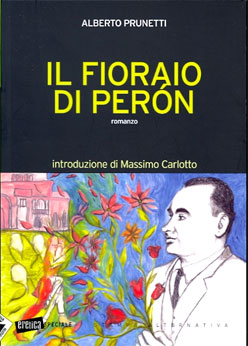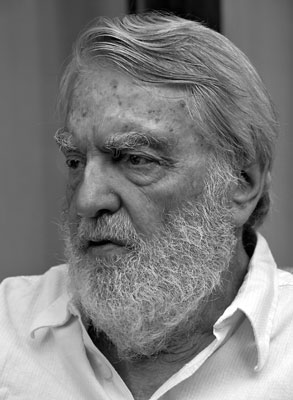 |
Il fioraio di Perón, Stampa Alternativa,
Viterbo 2010, 14,00 euro |
 This poor America
This poor America
This poor America. He actually said this: this poor America. Because he always separated the concepts as if they were separate cuttings, or slips of a different species of olive tree ... here and there by pressing a green table olives, and woe if you ended up in the wrong graft: rich America and poor America , one above and one below ... Even in those days, yes, even when that America over there, around and below the Tropic of Capricorn, was not so poor. Then at least, that hundred years ago, when he set in motion all the fuss. When Italy and a flag was made and the Italians, the fathers of their country, realized that the subjects were hungry, and son, and reproduced, and not satisfied by fine words, but they wanted bread, bread, just like that .
And then they began to look around if they were hungry, we had to send them away. There were colonies but not enough. There were jails, but they had already filled all of them with anarchists. There remained one solution: export the problem that you could not solve. Ie move the flaw to someone else. Put them all on a boat, the sun of the direction, which is known to rises in the east but then rolls over and goes westward. A then route to the west, and away to the promised land: in this hemisphere or another. There were those who left for America the rich and then went to Chicago or Detroit, there were those who were in poor America. That means good and is beneficial to repeat this end, then was not so poor, because they had not finished yet to be hungry. This America had open-pit mines of meat and coffee, wealth that in Italy were the dream, the fathers of their country with their head wall of the helmet of Scipio. So when it fell to him, the florist, he made the decision to go to Buenos Aires. Perhaps because he had some contact, or perhaps because expats are saying that the language was easier, so close to Italy do not have to suffer so much as it does with English.
That is, after all these years, when I found in my hands a photo of Alfredo, the old florist he said that his nephew resembled just that America poor Italian: “Alfredo's done a wonder it seems to have more than three years, confident that you are delighted with the little berbante. My aunt takes all the pictures i cuando come to the house the other grandchildren of some of you there inzegna them all by giving us an explanation that the boy in the photo is the son of the daughter of Cosimo's sister, so who is known by all cuase all Dicen that does not seem Italian, Dicen holding face Argentina, this poor America.”
This poor America, in fact. The florist with spelling had always a fight, graft Italy on the Spanish language created this strange creature who remained loyal throughout his life. They call it the cocoliche, which is the way the Italians in Argentina do talk. The picture had arrived in 1976, because the Italian nephew, who never met a florist, was born in 1973 and at the time of capture was only three years. The Argentine military dictatorship, the last and most ferocious, celebrated its first month of life and hoped to make America poorer. Cosimo, a florist, but he was seventy years old.
He was born into the world in 1906 in a Sicilian family of florists. The great-grandfather Alfred, who then was the father of the florist, had a flower shop and a nursery in Paceco, near Trapani. At home everyone knew how to weave garlands. The children went into the fields to try cuttings of wild plants. The old man put the grafted and planted in a portion of the estate he had bought. Cosimo was a great decorator. If he drew even in the nursery, but kept his talent for composition. He soon grew tired of dragging a donkey cart full of flowers on the dusty road that led from the store to the feud. Together with the old man he dug a well, built a bread oven, gave life to a garden full of oranges and lemons.
But the relationship between father and son deteriorated. All spoke of the immense city on the other side of the ocean, where we lost one day to return laden with riches. He decided to drop everything and, not yet twenty, set sail for Buenos Aires. Alfredo's grandmother, the sister of the florist, greeted him when he was six.
Cosimo found America in Argentina. He became very rich with a flower shop, the most important of Buenos Aires, according to him. In the late forties wove flowers for a special guest: President Perón. That's right: Don Cosimo was the Perón florist.
 |
Osvaldo Bayer |
 In the slum of Osvaldo Bayer
In the slum of Osvaldo Bayer
"The story of my flight began in October 1974 when I enrolled in the black list of Triple A, the Argentine Anticommunist Alliance, which was a bunch of murderers officers led by López Rega, el brujo, a sorcerer reactionary devotee of esoteric , a close friend of Licio Gelli. One morning on the newspaper there was this note: "... Mr. Osvaldo Bayer was sentenced to death by the Triple A”. They gave me twenty-four hours to leave the country, otherwise I was a dead man. They were angry with me for the film La Patagonia Rebelde, by Héctor Olivera, who was inspired by my book.
I talked with my wife, we could not take risks because the killers were serious. The one before me had been sentenced to death, the dean of the Faculty of Philosophy, refused to leave the country: they put a bomb under the house and killed his only son, who was six months. The next day my wife and four children left for Germany, while I was left alone here in Argentina, because I could not go, it was not right. I invited the military to a public debate in the auditorium of the Faculty of Philosophy, but nobody did show up. So I ran to hide.
The anarchist friends hid me in a house in Quilmes, surrounded by vegetation. It was summer and there was very cool, but I felt cut off from the world. The old anarchist who hosted me was the classic guy who did not buy the newspapers, had no radio or television, because, he said, "here come the news of the bourgeoisie." However, claro, one must also be informed of the news of the bourgeoisie ...
He told me not to fear, raised the hem of his jacket and pulled out a gun ... "Acá no entra nadie! " ... Yes, here does not enter anyone, but if it is a command of twenty people, you want to see as they enter ...
I started out. The next morning I went to the station, bought the newspaper, I read it, I infected the whole bourgeois world and then threw in the trash, so I came home clean. I had no fear, the fear when you threaten so do not feel it more, you do not think they will touch, that they will not do anything.
One day I went right in the center of Buenos Aires, at the intersection of Avenida 9 de Julio and Corrientes, and see if I meet with who? By Rodolfo Walsh, the Argentine writer who was later killed by the military, one of many ended up in the meat grinder of the dictatorship.
Walsh said: "What are you doing here?".
I replied: 'Me? And you? ".
He said, "It's different. You wrote La Patagonia rebelde. "
"And you wrote Operación Masacre, which is much more dangerous!"
"No, but it is not the same, is not the same ... Vamos a tomar café. "
At that time they killed you if they saw you on the street, but if they understood you were going out of the country you were left off. I left in February of '75 after being hidden four months. I was a year in Germany, until I learned from newspapers that Isabel Peron announced the election. Bueno, I said, if there are elections there will be more democracy, more freedom, or so said the bourgeois press.
But perhaps he was right about the newspapers, I had the old anarchist who concealed a year earlier: after three weeks since my return to Buenos Aires there was the coup of the military. I had to run away again, but now it was not so easy if you tried you were arrested. I did not belong to the guerrilla organizations, I had no bearings to escape abroad.
The day they killed the police chief the city was turned upside down, there was police and army everywhere, people were stopped on the street, asking for documents, information, above. I had to take refuge in the embassy in Germany. The cultural attaché took me by car to the airport of Ezeiza. On the way, the army stopped us, but my companion said that I was under the protection of the embassy. Arriving at the airport I had to show my documents. I was locked with a key employee of the embassy in one room, and I thought I would be arrested. At one point, came the master of Ezeiza, the brigadier general Santuccione, who told me: "You, sir, now you are gone ... we leave for the intercession of the German embassy, but remember ... never again ... never again return to limestone soil of the fatherland. "
As I flew over the rooftops of Buenos Aires I was convinced that the military was right, that I would never set foot in Argentina, and I could not sing, like Carlos Gardel, Mi Buenos Aires querido ...».

